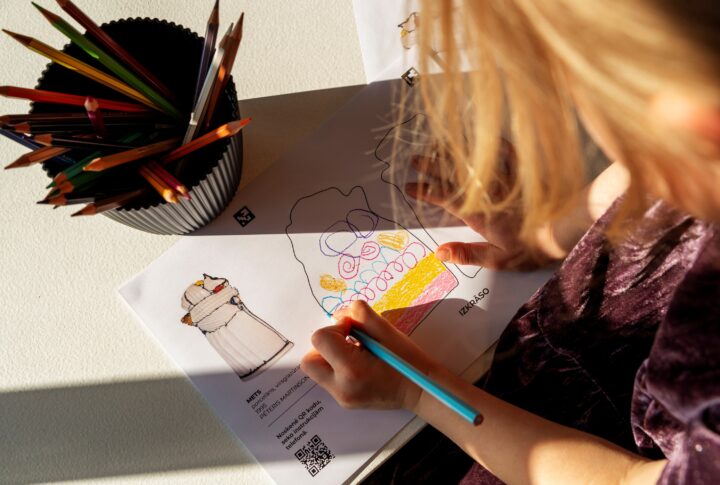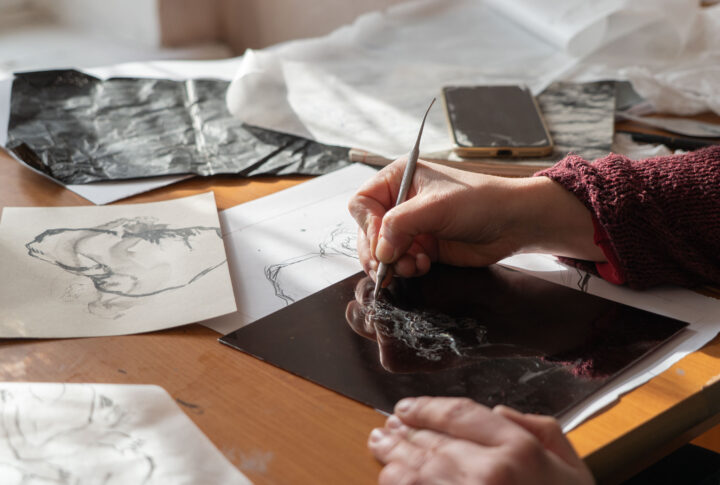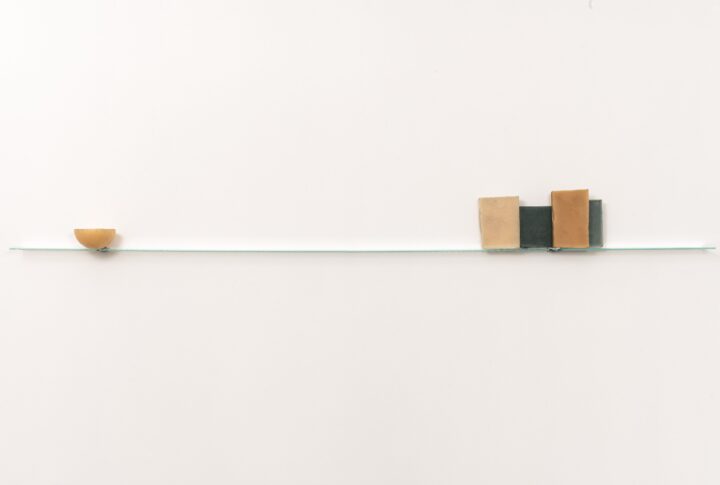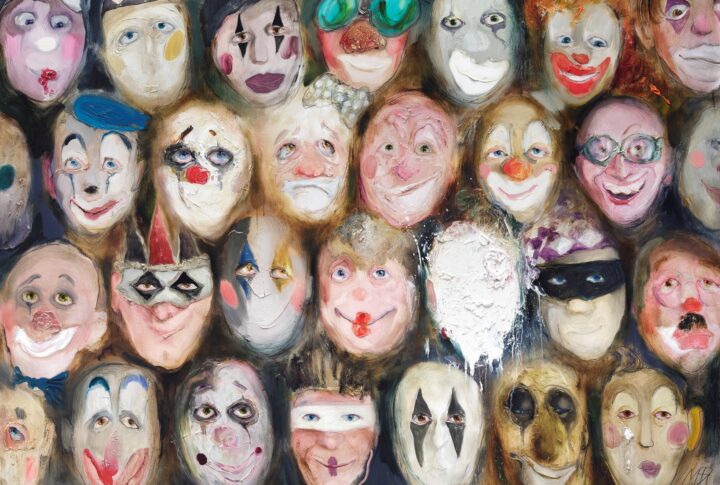Detailed information about individual artist projects
Art Group Sviter
Juliette – Queen of Podil, 2022
documentary 30 min
Podil—the historical part of the center of Kyiv—is now one of the centers of city life. There are cafes and restaurants, small shops and offices, an observation wheel, one of the most important educational institutions of the country, a market whose history dates back to the 15th century, architectural monuments of the Cossack Baroque, Middle Ages, Soviet Union, cult cinema, cult clubs… And it is in Podil that Juliet lives.
Juliet is 10-12 years old, she is smart, beautiful, independent, practical, a little spoiled. she has a difficult character and is not always in a good mood, but despite this, she is a very good girl.
As long as I have known her, which is about 5 or 6 years, she has lived under the stairs leading to several salons located on the first floor of one of the residential buildings. Juliet is a local star, Juliet is a dog.
No one knows where she got this name from, how she started living under the stairs, or how many small businesses have changed over her head. But, (almost) everyone knows Juliet.
Her bowl is always full of food (and this is constantly used by the pigeon neighbors), and often, by the composition of the food, you can discover that some of the residents of the area have had a celebration, because Juliet’s menu includes leftover sausages, ham, cheese, sometimes even jamon.
She guards her territory, greets acquaintances, and is one of those phenomenas that unites completely different people. Juliet is a guide between social worlds, through her the rhizome of local life is formed. Moreover, these roots extend to other areas of the city. So, a woman who once moved from Podil still to came to see Juliet during the COVID-19 lockdowns—and this is just one example.
At the end of February, I kept thinking of Juliet. I knew that she would cope better than anyone, but I also understood that war does not spare anyone.
As soon as the opportunity arose at the beginning of March I went to Podil. I saw block posts, anti-tank obstacles, bullet marks and broken windows. I didn’t see Juliet.
I already knew that she was scared of explosions, gunshots, air alarms, and that she was running around the district, looking for protection…
I know that she still lives in Podil, but in a new place, and someone is taking care of her—because the queen always needs care.
This video is an attempt to find Juliet and tell her story. This is a series of interviews with people who knew Juliet and fixation on the places where she lived. But this is also a story about the inhabitants of the city, about their experiences of living in war, about the fact that war changes everything forever.
Kinder Album
Bones&Limbs, 2022
ceramics and sound installation
Kinder Album ceramics are philosophical images of war, reflections on the past and the future. The exposition consists of two series created during the war. The Bones series is a reflection on the “future past”, on what will be left after us, on bones and archaeological artifacts that may one day be found. As the artist herself says: “Ukrainians are the descendants of Trypillians, Scythians, Polovtsians, Tatars and I am inspired by the thought that we have not forgotten their art, and just like them, we will leave our sights on this land.” The Limbs series is a certain illustration of the present, the main object of which is the body. The body as a way of life with its fragility and vulnerability, it irrevocably changes from the circumstances, brutally corrected by the traumas caused by reality.
The artist, in her own ironic way, forms the image of the generation growing up with deep wounds caused by the war in this project. To emphasize the absurdity and ambiguity of perception during the war, the artist uses figurative images in combination with an audio recording of the imitation of an air alarm siren made with children’s voices – a military children’s joke to scare adults. Thus, the circle of life distorted by military reality is closed.
Maksym Finogeiev
Will a rainbow appear after the storm?, 2022
photographs
Ukrainian LGBTQ+ people are under double pressure following Russia’s large-scale invasion of Ukraine, as the aggressor has publicly declared the destruction not only of Ukrainians, but LGBTQ+ people also. The unpredictable consequences of the war have made vulnerable groups even more vulnerable. The sense of threat has intensified the need for recognition of the rights and freedoms of LGBTQ+ people. In 2022 alone, the petition to the President of Ukraine on the legalization of same-sex marriage received the required number of votes of more than 28,000 signatures; he noted that the government is working on this issue.
With the status of EU candidate and the plan of Ukraine’s recovery with international partners, the state has committed itself to liberalize the legislation for LGBTQ+ people. That considered, these individuals have long ignored the promises made by the authorities and are used to living with constant risks because of their identity. In addition, the war has exposed new challenges and it is a true feat to remain who you are.
At the same time, in the midst of the catastrophe, it takes great effort to believe in life as the highest value. The author documents portraits of his queer surroundings, including himself. The emphasis is on men or those who identify as male. The attention to this particular gender is caused by the fact that for many men, during the martial law in Ukraine, it is forbidden to travel abroad and is also compulsory to perform military service in accordance with the established order and priority.
Mykhaylo Barabash
Potatoes FREE, 2022
drawings, installation, video 18.20 min
Potatoes FREE – not as fries but as free in the sense of “free”, “independent”, “liberating”, “liberated”.
Potatoes are one of the most important and widespread agricultural food crops. It is also one of my favorite dishes; and there are many dishes that can be made from it.
In fact, potatoes are called the second bread.
Potatoes became the main dish during the long wars in Europe in the XVII – XVIII centuries.
Due to the ease of cultivation, they saved many people from hunger on different continents.
It went from the noble plant used as an ornamental plant in the gardens of the nobility to the food of revolutionaries, the food of workers, craftsmen and peasants.
In the Ukrainian language, the number of names for potatoes is about 10, and taking into account the dialectic it is more than 20.
One of the worst pests is the Colorado potato beetle,which has black and orange stripes.
In my family we have been growing potatoes for as long as I can remember. We planted different varieties that changed according to their flavour characteristics and properties of potatoes towards degeneration. In my memory, we planted at different times: Slovianka (it was called “Slavianka”), Sinyoochka (it was called “Synieglazka”), Temp, Zarevo, Olvia, Nevskaya and finally Bellarosa (“Bela Rosa”).
In thinking about the future, I stopped on a simple everyday action – cooking. This is what people do regardless of the situation, because it is crucial to existence. And perhaps this is where you can “escape” from what is happening outside the window.
Olena Subach
We no longer feel the future, 2022
photographs, installation
Lviv, the city where I live, is located in the western part of Ukraine and is today the largest hub in the world for people hiding from bombing and rocket attacks. If we talk about the internally displaced persons who now live in Lviv, then officially it is more than three-hundred thousand. It is difficult to imagine the scale, but statistically it is as if the whole population of Iceland moved to Lviv. In fact, since the beginning of the war, Lviv has become a place where millions of refugees have found temporary shelter while looking for a safe place. Some of these people may be able to return home, but many will have nowhere to return to as the cities they lived in have been wiped off the face of the earth, as happened to Mariupol. From one of its citizens:
“To be able to evacuate from there, you have to become a different person – half empty and half new. Otherwise you have no chance to leave the city. You become a person who has no past, a person whose memories have no material basis. You have nothing left, not even the graves of your parents. In wartime, people are like trees. They are strong and powerful, the depth of their roots is many times greater than the height of their trunks. However, at one point these trees are uprooted. And not everyone can take root again and bloom again in spring and turn yellow in autumn.”
My project builds a narrative by combining photographs, taken before and after the full-scale Russian invasion of Ukraine, with a textile installation and apocalyptic images of medieval minuscules. The goal is to create a visual series and a space in which the visitor can plunge into the unknown world of other people’s feelings and experiences.
This war took away my memories, but I remember the stories of the people I meet. Those who were forced to leave their homes or lost them altogether.
Sergiy Petliuk
And who allowed you to live beautifully?, 2022
multimedia installation
And who allowed you to live beautifully? A photo with such an expression written with a spray can, as if on the wall of a house in Bucha, spread on social media in the first weeks of the full-scale invasion of Ukraine by the Russian army. Then, it later turned out that the photo came from Russia and had a longer history dating back to 2016. Despite this information, the phrase itself has become a winged expression that describes the barbaric seizure of territory, the marauding and destruction. In this expression, envy is intertwined with hatred and anger. The envy of those who do not want or cannot change their lives for the better of those who want to and can.
With this phrase, which is a kind of manifesto symbolizing the split of mentalities and worldviews, Russia and its citizens are bombing peaceful cities, killing innocent people, destroying valuable infrastructure and looting everything that can be robbed.
Yaroslaw Kostenko (VJ Yarkus)
Ashes of War, 2022
audiovisual installation
My country has now been at war with Russia for many months. During these months, my family and I have experienced a lot – bombings, rocket explosions, relocation, constant air raids, worrying about relatives and friends.
At the same time my brother lives with relatives in Moscow, Russia, and they have a completely different reality. He does not believe me and my parents from Ukraine. He and his children watch TV and believe in a different truth. It is very scary that with the help of media, that rulers can manipulate the consciousness of people, and set brother against brother. I do not want his children to go into Ukraine to fight again when they grow up. The only thing I want and can do through my art is draw people’s attention to the eternal values that are worth fighting for – peace, democracy, freedom, life, love…







